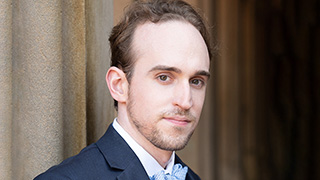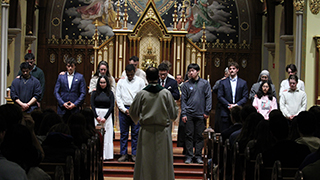From Classroom to Publishing Opportunities, Gregory Wiedman’s Hands-On Approach to Student Learning
Wednesday, September 3, 2025
 Gregory Wiedman, Ph.D., associate professor of Chemistry and Biochemistry in the College of Arts and Sciences and head of the 3B Lab, is deeply committed to teaching and mentoring his students.
His Biochemistry II course takes a hands-on approach, with students not only writing
reviews but also participating as peer reviewers and editors, mirroring the real-world
publishing process. As Wiedman explains, “A few years ago, I decided that one of the
interesting things I wanted to do was to provide an experience for the students where
they would go through the steps of writing a review that they would actually prepare
for publication, and get a chance to act as peer reviewers and editors.”
Gregory Wiedman, Ph.D., associate professor of Chemistry and Biochemistry in the College of Arts and Sciences and head of the 3B Lab, is deeply committed to teaching and mentoring his students.
His Biochemistry II course takes a hands-on approach, with students not only writing
reviews but also participating as peer reviewers and editors, mirroring the real-world
publishing process. As Wiedman explains, “A few years ago, I decided that one of the
interesting things I wanted to do was to provide an experience for the students where
they would go through the steps of writing a review that they would actually prepare
for publication, and get a chance to act as peer reviewers and editors.”
Wiedman continues, “The first year just so happened to be during the pandemic, so the class decided to focus on COVID-19. The following year, the students were interested in renewable energy and environmental remediation. This year, the class had an interest in AI, so we focused on that. It was kind of timely, and always shaped by the students’ interest.” He also added, “One of the things I thought was really cool was bringing students who had published their papers in the past as editors themselves, which I thought was beneficial for them and provided an ongoing educational experience.”
As a result, the reviews created by students in this class have been compiled into the Seton Hall Biochemistry II Annals of Student Reviews, which is now housed in Seton Hall’s eRepository, hosted by University Libraries. This collection of student reviews has also captured global attention, with works being widely read and downloaded around the world. For instance, the United States leads the way with 900 downloads, followed by Brazil with 130, India with 113, China with 109, and the Philippines with 102. Other countries such as the United Kingdom, Canada, Singapore and Japan also show strong engagement, with total downloads from these regions reaching 970. In addition, major institutions such as Duke University, Ashland Inc., Pennsylvania State University, the Department of Veterans Affairs, and Yale University, among others, have also shown strong interest in these students’ reviews, with a total of 396 downloads.
In his lab, which is located in the McNulty Building, Wiedman works closely with both graduate and undergraduate students. He emphasizes the importance of maintaining close relationships with his students. “I want to be actively involved with my students. I like talking to the students to gauge their current interests.”
Wiedman is also involved in outreach through his work with the Committee on Public Relations and Communications at the American Chemical Society (ACS). He recently organized a successful webinar titled “How to Use AI to Supercharge Your Research and Communication” on the impact of artificial intelligence on chemistry and chemistry communication. The webinar invited experts such as Renee Robinson, Ph.D., professor in the Department of Communication, Media, and the Arts at Seton Hall University, who is a leading figure in understanding how AI is impacting communication; and Juan Cruz, Ph.D., P.E., associate professor in the Department of Biomedical Engineering at Universidad de los Andes, Bogotá, Colombia, who is applying AI in practical chemistry and biochemistry applications.
As Wiedman explains,
I pitched the idea of the webinar because people are talking about AI, and it’s on everyone’s mind. It’s now becoming a big part of our strategic plan at the university, so we thought it was important to host a webinar to help people understand how AI is having impact.
The event was well-received, with a total of 1,824 global participants and about 900 live attendees. There were hundreds of questions, many more than could be addressed during the webinar, and the session was widely watched afterward. “It was really popular,” Wiedman notes. “So I think we're going to try to do another one in the future.”
In addition to his teaching and outreach efforts, Wiedman is also advancing research. Last year, he received a patent for a group of antimicrobial peptides designed to fight fungal infections, particularly Cryptococcus neoformans, a pathogen that can cause severe illness in immunocompromised individuals. The need for this innovation is clear, as Wiedman explains: “Currently, there are only three main classes of antifungal drugs. The situation is complicated by the overuse of one of these classes, Azoles, in agriculture. The overuse can lead to resistance, which reduces the available classes of drugs down to just two. That’s why we’re urgently looking for ways to either supplement the current treatments or introduce entirely new ones.”
This is precisely what Wiedman’s patented peptides aim to achieve: improving the activity of existing treatments and possibly providing a new option. He continues, “Our peptides are designed to improve the activity of the existing ones, make them more useful for a longer term, and provide maybe a fourth option of class of antifungal.”
In recognition of his achievements, Wiedman was honored with an Alumni Spotlight and profiled by Johns Hopkins University on August 16, 2024, from which he earned his Ph.D.
Categories: Education, Research






